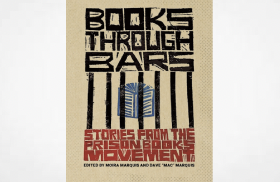This is so depressing i feel like crying on reading it.
The abject cruelty within the US prison knows no bounds and sometimes i wonder if the soviet gulag system was actually better than being in prison in 21st century America.
Kwaneta Harris Explores Systemic Censorship Within the Criminal Justice System
The Lonestar State wants to control women’s bodies, but the abortion ban is not the only way.
It’s 6:07am. Out my window, I see the lady from the mailroom walking with a full cart of items. I skip the five steps to the door of this cell and announce, “Mailroom!” Everyone is excited. When I get books, I’m like a six-year-old on Christmas morning. In solitary confinement, the only pleasure I have is reading. Living in a cell the size of a parking space without a television, tablet, phone, or air-conditioning and an only temperamental radio signal, a book is more than entertainment and much needed distraction. It is a rare moment when I’m not reminded where I am.
The average stay in solitary is seven years. I’m at five and a half.
 Art for Photo Requests from Solitary, an ongoing project that invites men and women held in long-term solitary confinement in U.S. prisons to request a photograph of anything at all, real or imagined, and then finds an artist to make the image. http://photorequestsfromsolitary.org/91-2/
Art for Photo Requests from Solitary, an ongoing project that invites men and women held in long-term solitary confinement in U.S. prisons to request a photograph of anything at all, real or imagined, and then finds an artist to make the image. http://photorequestsfromsolitary.org/91-2/
People in solitary aren’t allowed to go to the prison library. For some reason, we still receive the (rendered useless) library catalog. If we have been discipline-free for ninety days, we qualify for one book a week, delivered from the library. It’s easy to receive an infraction. Examples include sharing reading materials and/or food with neighbors, covering your windows to block the blazing sun during triple digit temperatures or questioning guards. Whether we request a specific book and author or a generic mystery, romance or humor book, the librarian always sends a Christian themed book. In 2018, I asked her, “Why don’t you give me what I request?”
Books matter just as much for people who don’t and/or can’t read as they do for those of us who do.
She said, “I’m called to save your heathen soul.” I’m locked in this cell twenty-three to twenty-four hours a day. Solitary confinement is where we need the books the most. Yet, prisons put up innumerable barriers for people in solitary to receive books.
A recent example: we all heard the rumors, via CNN (Convict News Network) also called the grapevine, that the mailroom posed a “No Sexually Explicit Material” notice in General Population. Nobody paid attention to it. We thought, “That’s for male prisoners.” There isn’t a market for partially nude celebrity photos in women’s prisons. Little did I know, how extreme this notice was to be enforced. In fact, its enforcement redefined “sexual.”
A week prior, I was denied my Good Housekeeping magazine because of a supposedly sexually explicit image. In instances like this, they don’t rip out the offending page. Instead, the entire magazine is denied. The thing is: the image was an advertisement for Depends—the adult diaper. It displayed an older woman wearing a Depends undergarment—which was deemed sexual.
My USA Today was also rejected to a supposedly sexual image—Simone Biles, the Olympic gymnast, wearing her gymnastic leotard. The NY Post was also denied because it contained content regarding former Governor Cuomo. Allure Magazine was denied because of a pregnant woman whose belly was exposed and painted with body paint. A bikini clad model advertising a protein drink led to various magazines—Vanity Fair, CG, Esquire, Cosmopolitan—being denied. The decision is final, and I can’t appeal. These bans are a result of all men at the table, as well. It’s hard to believe a woman of any race, age, political ideology or religion would think a mature woman wearing incontinence underwear would be a sexual image for another woman to view.
But I’m not thinking about any of that as the mail lady approaches my door. I’m bouncing off the walls with anticipation. I’m hopping from one foot to the other. I notice my four books in a neat stack. She pushes a yellow carbon form through the gap in the door as she says, “I’m sorry. You’re denied all four books.” The art book is apparently sexually explicit. The book on menopause includes “sexual images.” The book I wanted on healing from childhood sexual trauma contains terms the prison has prohibited: rape, sexual assault, sexual harassment, sexual abuse and… sex. The book on prison abolition is denied because it would “incite violence.” My mouth falls and I realize my hand is wet with tears, already freely flowing.
They can imprison our bodies but not our minds, or so I thought.
Read on at




